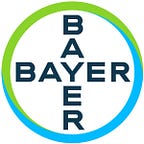Heart Health: Learn from a Lucky Survivor
By Bill Holsten, Front End Innovation, Global Design & Packaging, Bayer Consumer Health
I’m a very lucky guy who’s alive today despite ignoring too many warning signs. And, thanks to amazing doctors and medical technology.
My story starts 10 years ago with my left knee. It hurt and was getting worse. My orthopedist recommended that it be surgically replaced.
Prior to my knee replacement operation, I scheduled an appointment with my general practitioner to get surgery clearance. The doctor who saw me was a cardiologist who was covering for my regular doctor. At the time of my visit, I was over 50, overweight and had sleep apnea. During the exam, she looked at my EKG and saw an abnormality important enough to schedule a stress test.
I considered this a nuisance and over caution. I wanted my knee fixed. I wasn’t feeling chest pain or any symptoms. I had no family history of heart problems. My total cholesterol had been in the normal range. I had been feeling tired a lot — but I thought that went along with getting older, being fat, not exercising at all and staying very busy at work and at home.
A few days later the stress test and another heart test found that my heart was pumping at 49% of its capacity. The norm for my age is 60–70%. The cardiologist recommended I then have a “cardiac catheterization” procedure in the hospital to see if there were any blockages in my heart’s blood flow. She said if they found any they would likely put in a stent or two.
Now, she had my full attention.
Two weeks later, I was at the hospital for the catheterization. You stay awake during this procedure, so the doctor can talk to you. As he probed, I heard him say “ohh…,” “hmmm…,” and that he found more than one significant blockage. At the end, he came and showed me on the computer screen: My main coronary artery was 99% blocked and at least three others were 80–90% blocked.
He said, “Some blockages are in branches and they’re very complex, and I don’t think stents will succeed.” The next four words he said hit me hard — and, to me, they echoed as though they were said in slow motion: “YOU NEED HEART SURGERY.”
I had the next 15 days to wait before my surgery date — plenty of time for soul searching, worry, prayer — and eating only those foods I could trust NOT to turn my 99% blockage into permanent lights out. I called it the “scared shootless” diet (except I didn’t say “shoot”). In the two weeks, I lost six pounds without doing any physical work.
Ten years ago, on March 31, I had a quadruple coronary artery bypass graft procedure at Morristown Memorial Hospital. Five days later I was home and on the way to recovery.
I’m still taking medications for blood pressure and cholesterol, and a low dose Bayer Aspirin every day. I’ll probably do this for life. And, I have checkups with my cardiologist twice a year.
This heart surgery medical miracle, the love of my family and the grace of God have given me the past 10 years to enjoy, to think about and to share the lessons from this experience.
The first lesson: I should have taken better care of myself. For the two years prior to the bypass surgery, I had been the senior brand manager on U.S. Bayer Aspirin. We were partners with the American Heart Association. I’d been to their Dallas headquarters and been directly engaged in websites and education materials about staying heart healthy with simple diet and regular exercise. Shame on me! I didn’t follow that advice when I was responsible for telling it.
The second lesson: Self-care is long term, not a fad or quick fix. In the two years after the bypass surgery, I lost nearly 100 pounds, talked a lot about the experience (look up “Bypass Bill” on Youtube) and was at every Heart Walk for four years. But then, over time, it all faded back to normal. I tried sticking to the “scared shootless diet” but started nibbling on sweets and ice cream. Soon I was back to being the ignorant unhealthy eater I’d been before, and gained back most of the weight I’d lost.
Then gravity took over, and both knees started hurting bad. Two years ago, I finally had knee surgery — on both knees.
Last year, I took an intensive three-month “lifestyle change” course at Morristown Medical Center with intensive nutrition, exercise and stress management training. I’ve dropped most of the extra weight, walk five to six miles a day and feel fantastic. I’m hoping this time the healthy habits stay with me in my 60s, 70s and beyond. My family’s counting on me. I’m counting on me.
The lessons from this are very simple. Living and applying them takes effort every day.
Aspirin is not appropriate for everyone, so be sure to talk to your doctor before you begin an aspirin regimen.
